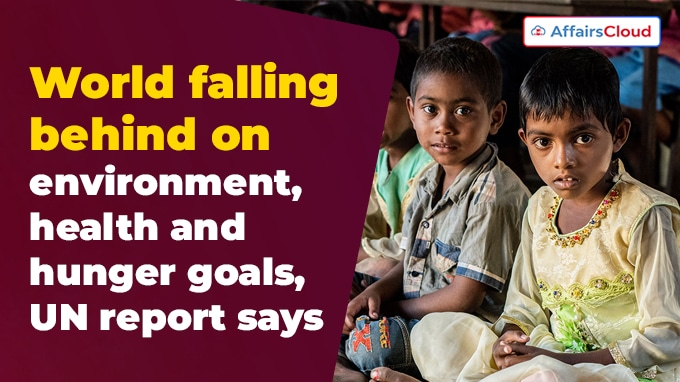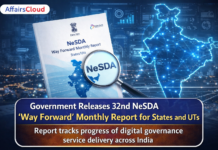 According to the 9th edition of the “Sustainable Development Report (SDR)” released by the UN Sustainable Development Solutions Network (SDSN), the world is significantly behind schedule in achieving the Sustainable Development Goals (SDGs) set by the United Nations (UN) in 2015, such as poverty reduction, hunger eradication, and environment protection.
According to the 9th edition of the “Sustainable Development Report (SDR)” released by the UN Sustainable Development Solutions Network (SDSN), the world is significantly behind schedule in achieving the Sustainable Development Goals (SDGs) set by the United Nations (UN) in 2015, such as poverty reduction, hunger eradication, and environment protection.
- As per the SDR 2024 report, none of the 17 SDGs are on track to be achieved by 2030.
Key Findings of the report:
i.The report highlighted that globally, on an average only 16% of the SDG targets are on track to achieved by 2030. While, remaining 84% of the SDG targets showed a reversal of progress.
- Globally, since 2015, the 5 SDG targets on which maximum countries showed a reversal of progress include: obesity rate (under SDG2), press freedom (under SDG 16), the red list index (under SDG 15), sustainable nitrogen management (under SDG 2) and life expectancy at birth (under SDG 3).
ii.The report noted that at the global level, SDG progress has been stagnant since 2020, particularly some SDG targets are off-track such as: Zero Hunger (SDG 2), Sustainable Cities and Communities (SDG 11), Life Below Water (SDG 14), Life on Land (SDG 15) and Peace, Justice, and Strong Institutions (SDG 16).
- The report cited COVID-19 pandemic has further augmented the existing challenges particularly, impacting life expectancy (SDG 3).
iii.The report observed that Nordic countries continue to lead on SDG achievement, with BRICS countries (Brazil, Russia, India, China, South Africa) showing strong progress while, poor and vulnerable countries are lagging far behind.
- The report backed the above findings based on 2024 SDG Index which provides an assessment of SDG progress in all 193 UN member nations.
- 2024 SDG Index was topped by Finland, followed by Sweden (2nd), Denmark (3rd), Germany (4th) and France (5th). But still, these countries face major challenges in achieving various SDGs.
2024 SDG Index- Top 5 Countries:
| Position | Country |
|---|---|
| 1 | Finland |
| 2 | Sweden |
| 3 | Denmark |
| 4 | Germany |
| 5 | France |
| 109 | India |
- Since 2015, average SDG progress in BRICS countries and BRICS+ Countries (Egypt, Ethiopia, Iran, Saudi Arabia, and the United Arab Emirates (UAE)) has been faster than the world average.
- The report noted that the gap between the world average SDG Index and the poorest and most vulnerable countries, including, Small Island Developing States (SIDS) has widened significantly since 2015.
Note: According to the 2024 SDG Index, India secured 109th rank with overall score 64.0.
iv.The report emphasized on critical need to reform the global financial architecture. It highlighted Low –Income Countries (LICs) and Lower-Middle-Income Countries (LMICs) urgently required access to affordable long-term capital in areas like education (SDG 4) to achieve their sustainable development goals.
- It proposed 5 strategies to address financing shortfalls which includes: establishment of new institutions, innovative global taxation schemes, and shift in priorities towards investments like: quality education.
v.The report introduced new Index of countries’ support to UN-based Multilateralism (UN-Mi) . The new index has ranked countries based on their engagement with the UN system, including:
- Barbados topped the UN-Mi index followed by Antigua and Barbuda (2nd), Uruguay (3rd), Mauritius (4th), and the Maldives (5th).
- Bottom 5 Countries in UN-Mi index are: the United States of America (USA) (193rd), Somalia (192nd), South Sudan (191st), Israel (190th), and the Democratic Republic of Korea (189th).
vi.The report revealed that SDG targets related to food and land systems are particularly off-track. It cited that 600 million people globally will still suffer from hunger by 2030 combined with increasing obesity globally, and emission of Green House Gases (GHGs) from Agriculture, Forestry, and Other Land Use (AFOLU).
- So, SDR proposed new Food, Agriculture, Biodiversity, Land-Use, and Energy (FABLE) pathways to support sustainable food and land systems. It aimed to bring together over 80 local researchers across 22 countries to examine how 16 targets related to food security, climate mitigation, biodiversity conservation and water quality could be achieved by 2030 and 2050.
About UN Sustainable Development Solutions Network (SDSN):
The SDSN is a non-profit created in 2012 by the UN to promote the 17 SDGs at national and international levels. The Secretariat of the SDSN is located in Paris, France; Kuala Lumpur, Malaysia; and New York, USA.
President- Jeffrey Sachs




